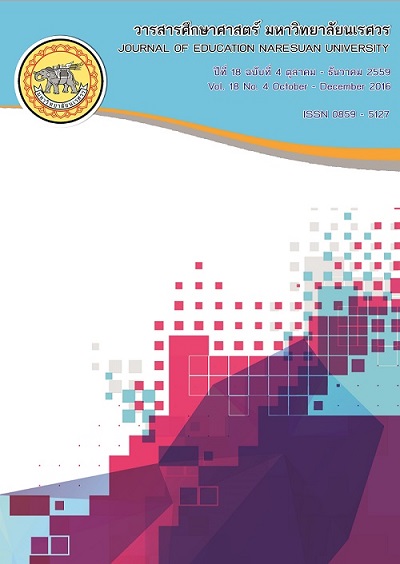การจัดการเรียนรู้แบบบูรณาการสะเต็มศึกษา สำหรับนักศึกษาวิชาชีพครู
Main Article Content
Abstract
สะเต็มศึกษา (STEM Education) เป็นแนวทางการจัดการเรียนรู้แบบบูรณาการ วิทยาศาสตร์ เทคโนโลยี วิศวกรรม และคณิตศาสตร์ ที่มุ่งให้ผู้เรียนนำความรู้ไปใช้แก้ปัญหาในชีวิตจริง โดยจะพัฒนากระบวนการหรือผลผลิตใหม่ที่เป็นประโยชน์ต่อการดำเนินชีวิตและการประกอบอาชีพ ผ่านประสบการณ์ในกิจกรรมการเรียนรู้แบบโครงงานเป็นฐาน (Project-Based Learning) หรือกิจกรรมการเรียนรู้แบบใช้ปัญหาเป็นฐาน (Problem-Based Learning) ที่ช่วยส่งเสริมให้ผู้เรียนมีทักษะและสมรรถนะที่สอดคล้องกับความต้องการที่เปลี่ยนแปลงไปตามสังคมปัจจุบันและความก้าวหน้าในศตวรรษที่ 21 สะเต็มศึกษายังช่วยให้ผู้เรียนเกิดทักษะด้านความรู้ ทักษะทางปัญญา ทักษะความสัมพันธ์ระหว่างบุคคลและความรับผิดชอบ ทักษะการคิดวิเคราะห์เชิงตัวเลข การสื่อสารและการใช้เทคโนโลยี ฉะนั้น การฝึกประสบการณ์ให้กับนักศึกษาวิชาชีพครู เพื่อให้สามารถจัดการเรียนรู้แบบบูรณาการสะเต็มศึกษาในโรงเรียนได้ จึงเป็นความต้องการของสังคมในปัจจุบัน
LEARNING MANAGEMENT BASED ON STEM EDUCATION FOR STUDENT TEACHERS
STEM Education is an integrated learning management approach comprising four specific disciplines; science, technology, engineering and mathematics, which aim to enhance learners’ ability to bring what they have experienced onto their problem solving or occupations. STEM Education also develops processes or new products, which are useful for learners in their real lives through Project-Based Learning or Problem-Based Learning. Both Project-Based Learning and Problem-Based Learning also assist the learners’ skills and abilities correlated with the change of current society and the world in the 21st century. Moreover, STEM Education plays an important role on assisting learners to improve knowledge, cognitive skills, interpersonal skills and responsibility, numerical analysis, communication and information technology skills. For these reasons, learning management based on STEM Education for student teachers is needed.
Article Details
The owner of the article does not copy or violate any of its copyright. If any copyright infringement occurs or prosecution, in any case, the Editorial Board is not involved in all the rights to the owner of the article to be performed.


